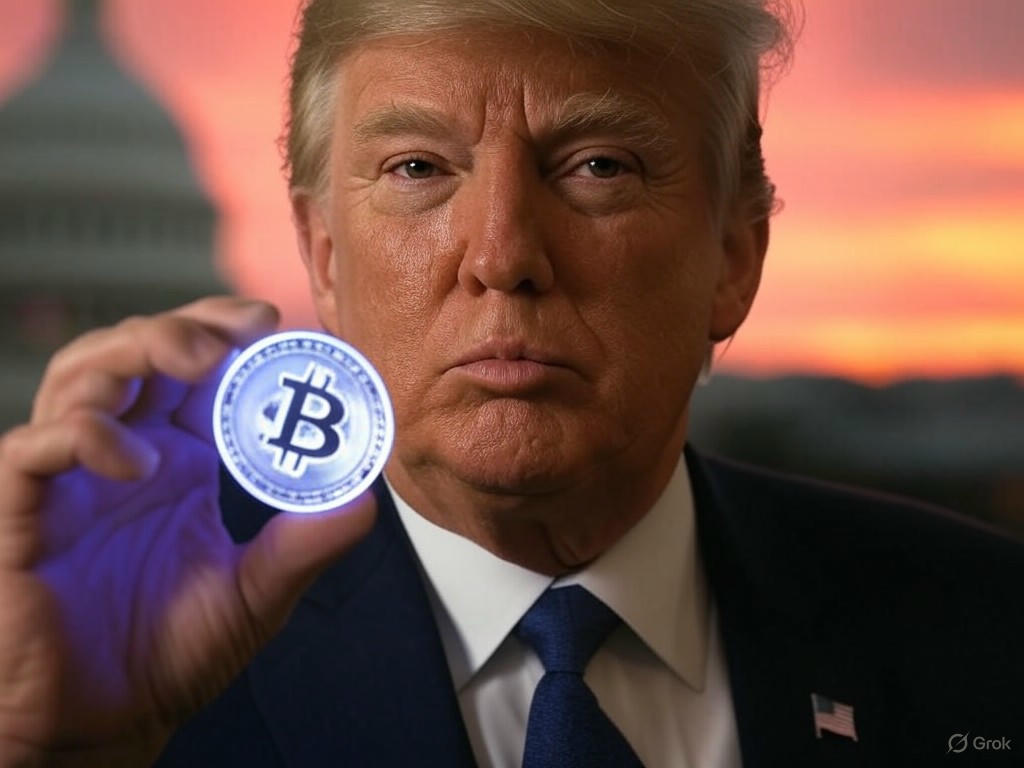
Trump’s Crypto Deals Spark Senate Probe and Backlash
Trump’s Cryptocurrency Ventures Trigger Senate Investigation and Legislative Delays
Have you ever wondered how a president’s personal investments could shake up national policy? Trump’s crypto deals have ignited a firestorm in Washington, drawing sharp scrutiny from Senate Democrats. These dealings, centered on digital assets, raise red flags about conflicts of interest that could undermine federal governance.
Key figures like Senators Jeff Merkley and Elizabeth Warren are leading the charge, arguing that Trump’s involvement makes the government susceptible to foreign influences. It’s a classic case of where private business meets public power, and the fallout is already stalling key legislation. Imagine trying to pass a law while your opponent’s financial ties are under a microscope—what could that do to bipartisan efforts?
Trump’s crypto deals aren’t just about money; they’re about ethics and accountability in leadership. As this unfolds, it’s clear that these ventures could reshape how we view presidential business interests in the digital age.
The Controversial MGX-Trump Crypto Deal and Senate Backlash
At the heart of the Senate probe into Trump’s crypto deals is a partnership between Abu Dhabi’s MGX and World Liberty Financial, a firm linked to Trump’s family. This arrangement involves using a stablecoin for investments in Binance, a major player in the crypto world. Critics see it as a risky move that blurs lines between foreign money and U.S. policy.
Senators Warren and Merkley have labeled it “alarming,” pointing to potential constitutional violations. Warren’s pointed remarks highlight how Trump’s crypto deals might expose the U.S. to undue foreign sway, especially from entities like the UAE. This isn’t just business as usual—it’s a prime example of how personal gains could compromise national security.
If you’re following crypto trends, this deal shows the high stakes involved. The U.S. Office of Government Ethics is now in the spotlight, with formal requests for investigation pouring in. Trump’s crypto deals have turned what should be a routine investment into a national debate.
Legislative Fallout: How Trump’s Crypto Deals Are Halting the Stablecoin Bill
The ripple effects of Trump’s crypto deals are hitting Capitol Hill hard, with Democrats putting the brakes on the Guiding and Establishing National Innovation for U.S. Stablecoins of 2025 (GENIUS Act). What was once a bipartisan effort is now mired in controversy, thanks to these financial entanglements. This delay could set back the entire crypto regulatory framework.
Senator Ruben Gallego and colleagues are withholding votes, making it tough to clear the Senate filibuster. Think about it: In a chamber that needs 60 votes for progress, a few key players can grind everything to a halt. Trump’s crypto deals have amplified concerns over financial risks, turning potential allies into skeptics.
Here’s a quick tip for anyone invested in crypto: Keep an eye on how political drama affects market rules. The stalling of this bill might mean more uncertainty for stablecoins, which are meant to stabilize the volatile world of digital assets.
Changes That Triggered Democratic Opposition to Trump’s Crypto Deals
Recent tweaks to the stablecoin bill have fueled Democratic pushback, especially with Trump’s crypto deals in the mix. Nine senators, including former supporters, now argue that these changes expose the financial system to unacceptable dangers. It’s like patching a leak only to find a bigger one elsewhere.
Republicans aimed to rush the bill through for a quick win, but Trump’s crypto deals have changed the game. This opposition isn’t just about policy—it’s a strategic move in a larger political battle. If you’ve ever dealt with regulatory changes in your own investments, you know how quickly things can shift.
Trump’s Defense Amid Growing Scrutiny of His Crypto Deals
Donald Trump isn’t backing down from the criticism surrounding his crypto deals. In a recent NBC News interview, he dismissed claims of personal profit, saying he hasn’t even checked his portfolio. It’s his way of framing these ventures as a national priority rather than self-interest.
He’s pushing for the U.S. to lead in crypto to outpace rivals like China, highlighting Bitcoin’s staying power through market ups and downs. But critics counter that Trump’s crypto deals might be giving the industry—and his own companies—an unfair edge. What do you think: Is this about innovation or influence?
Under Trump’s watch, the SEC is shifting toward a more crypto-friendly stance, which could open doors for investors. Yet, as one Forbes report notes, this might blur the lines between policy and profit in ways we’ve never seen with Trump’s crypto deals.
Political Analysis: Beyond the Immediate Impact of Trump’s Crypto Deals
Is this Senate backlash purely about ethics, or is there more at play? Analysts like Jaret Seiberg from TD Cowen suggest it’s largely political theater, with Trump’s crypto deals making it hard for Democrats to support related bills. They’re using this as leverage in negotiations.
Even so, Seiberg predicts the stablecoin legislation will eventually pass, thanks to the crypto industry’s lobbying power. It’s a reminder that money talks in Washington, but Trump’s crypto deals have added a layer of complexity. For everyday folks, this means watching how partisan games affect tech advancements.
Consider a hypothetical: If your business relied on clear crypto regulations, how would these delays impact your plans? It’s a question many in the industry are asking right now.
Broader Implications for Crypto Regulation Due to Trump’s Crypto Deals
Trump’s crypto deals are casting a long shadow over the future of digital asset rules. Democrats who were once open to crypto-friendly laws are now hesitant, fearing that Trump’s blending of business and politics sets a dangerous precedent. Experts like Lee Reiners from Duke University call it a blatant mix that could erode trust in government.
This tension is spilling into other areas, like House committee hearings on market structure. Representative Maxine Waters is blocking joint efforts, showing how one president’s crypto deals can influence the entire legislative process. It’s a test of bipartisan cooperation in an era of deep divides.
Here’s some advice: If you’re navigating the crypto space, stay informed on political developments. They can make or break investment strategies, especially when figures like Trump are involved.
Testing Bipartisan Cooperation Through Trump’s Crypto Deals
The fight over Trump’s crypto deals is putting Republican efforts to collaborate with Democrats to the test. Without cross-aisle support, bills like the stablecoin act are stuck. It’s one of the early challenges for Trump’s second term, where unity is key but hard to achieve.
Democrats, meanwhile, are grappling with their own internal debates on crypto’s pros and cons. Senators like Warren are rallying against compromises, making Trump’s crypto deals a flashpoint for party strategy. This could redefine how future administrations handle personal interests.
Trump’s Expanding Crypto Empire and Its Ties to Policy
Beyond the headlines, Trump’s crypto deals include events like dinners for memecoin holders, which some view as using his office for promotion. His launch of World Liberty Financial has drawn comparisons to erasing boundaries between private ventures and public policy. The New York Times even called him the industry’s top policymaker.
Critics estimate these deals could net him millions, intensifying ethical concerns. It’s a scenario that raises questions: How do we balance innovation with accountability? If you’re in crypto, this is a wake-up call to watch for similar conflicts.
Trump positions this as a step toward U.S. dominance in digital assets, but the Senate probe keeps the pressure on. His growing empire might inspire change, but at what cost?
Industry Response and Future Outlook on Trump’s Crypto Deals
The crypto sector has poured millions into politics, and it’s paying off with a pro-crypto administration. Yet, Trump’s crypto deals are creating roadblocks, like delays in regulatory clarity that the industry craves. Despite this, leaders remain optimistic about U.S. leadership in the field.
Bitcoin’s resilience amid volatility is a point Trump often cites as proof of potential. For investors, this means weighing political risks against rewards. Could Trump’s stance ultimately benefit the market, or is it just fueling more uncertainty?
To wrap this up, always diversify your portfolio and stay engaged with news. It’s the best way to navigate an evolving landscape shaped by figures like Trump.
Conclusion: Constitutional Questions and Political Reality of Trump’s Crypto Deals
In the end, Trump’s crypto deals boil down to core issues of ethics and power. Democrats see constitutional risks in mixing business with the presidency, while Trump insists it’s for the greater good. Senate leaders like Chuck Schumer are urging caution, making this a pivotal moment in crypto policy.
As debates continue, they could set standards for how we handle such conflicts moving forward. What are your thoughts on this? Share in the comments below, and feel free to explore more on our site about crypto trends.
If this topic interests you, check out related articles or dive deeper into the implications. Let’s keep the conversation going—your insights matter!
References
1. Merkley and Warren’s letter on Trump’s crypto deal: Banking Senate Committee.
2. Democrats probe crypto deal: Punchbowl News.
3. Crypto stablecoin Senate updates: Politico.
4. Trump crypto deals provoke Senate backlash: The Seattle Times.
5. Trump’s ties and crypto bills: CoinDesk.
6. Trump and World Liberty Financial: The Week.
7. Senate Democrats stall stablecoin bill: AInvest.
8. Trump on America’s need for crypto: DIG.Watch.
Trump crypto deals, Senate investigation, cryptocurrency legislation, conflict of interest, stablecoin bill, World Liberty Financial, Trump cryptocurrency ventures, crypto regulatory backlash, presidential ethics in crypto, digital assets policy







